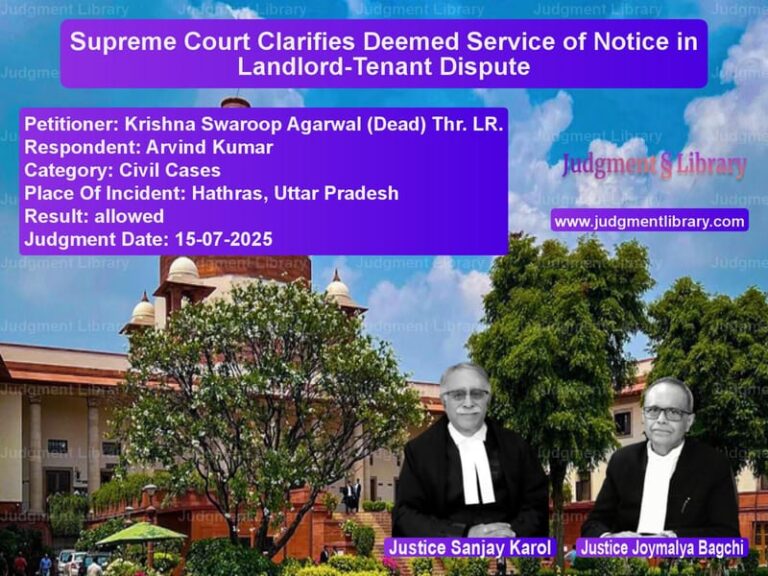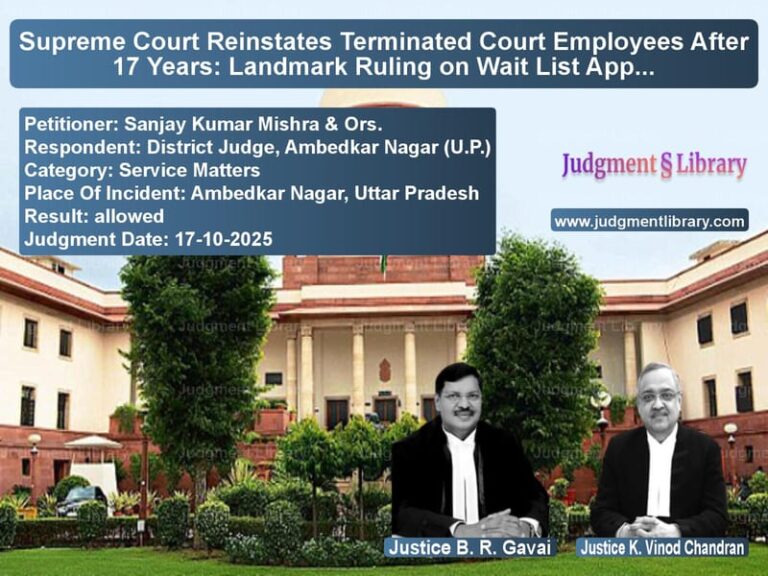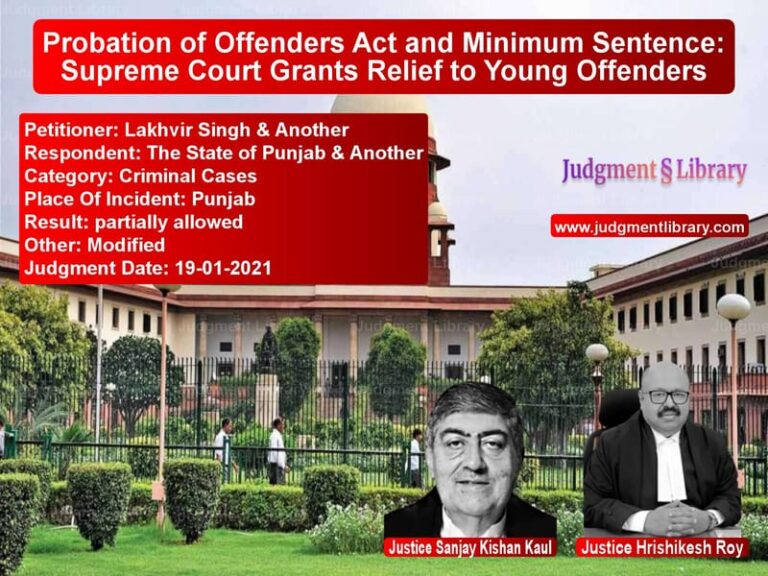Supreme Court Directs Implementation of Resolution Plan in Amtek Auto Insolvency Case
The Supreme Court of India, in a significant ruling, directed the immediate implementation of the resolution plan for Amtek Auto Limited, a company undergoing insolvency proceedings. The case, titled Committee of Creditors of Amtek Auto Limited through Corporation Bank v. Dinkar T. Venkatsubramanian & Ors., revolved around the delay in executing a resolution plan submitted by Deccan Value Investors LP (DVI), the successful resolution applicant. The Court emphasized the importance of timely completion of insolvency resolution processes under the Insolvency and Bankruptcy Code (IBC), 2016, to ensure that the objectives of the Code are not defeated.
Background of the Case
Amtek Auto Limited, a corporate debtor, was admitted into the corporate insolvency resolution process (CIRP) on July 24, 2017, under Section 7 of the IBC. The Committee of Creditors (CoC) invited resolution plans from prospective applicants. Initially, Liberty House Group Private Limited submitted a successful resolution plan, which was approved by the National Company Law Tribunal (NCLT) on July 25, 2018. However, Liberty House failed to implement the plan, leading to multiple legal proceedings against it.
Following Liberty House’s failure, the CoC sought permission to restart the resolution process and invite fresh bids rather than forcing the company into liquidation. Subsequently, the CoC approved a resolution plan submitted by DVI, which was approved by NCLT in July 2020.
However, DVI attempted to withdraw from the resolution plan, citing various grounds, including the COVID-19 pandemic. The CoC filed a contempt petition against DVI for failing to honor its commitments. The Supreme Court intervened to prevent further delays in the insolvency process.
Arguments by the Petitioner (Committee of Creditors)
The CoC, represented by the Solicitor General, argued that:
- The corporate debtor was a financially viable entity, and there was sufficient market interest in its resolution.
- The primary objective of the IBC is to resolve distressed companies and maximize the value of their assets.
- DVI had fraudulently delayed the implementation of the resolution plan, causing financial losses to stakeholders.
- The time spent in litigation should be excluded from the statutory timeline for CIRP.
Arguments by the Respondents (DVI)
DVI, the successful resolution applicant, contended that:
- The COVID-19 pandemic created unforeseen financial and logistical difficulties in executing the resolution plan.
- Several pre-conditions for implementation were not fulfilled by the corporate debtor and other stakeholders.
- DVI should be permitted to renegotiate certain terms of the resolution plan.
Supreme Court’s Observations and Judgment
The Supreme Court, while dismissing DVI’s attempts to renege on its commitments, made the following key observations:
- The resolution plan, once approved by the NCLT, is binding on all parties, and failure to implement it amounts to a breach of legal obligations.
- The objectives of the IBC include ensuring the revival of companies in distress and preventing undue delays in insolvency resolution.
- The insolvency process must be completed within the statutory time limit of 330 days as prescribed under Section 12 of the IBC.
- DVI’s attempts to renegotiate the resolution plan were contrary to the legal framework governing insolvency proceedings.
The Court ordered DVI to immediately transfer INR 500 crores into the bank account of Amtek Auto Limited for distribution to creditors as per the resolution plan. It also warned of serious consequences if any party failed to comply with the order.
Key Legal Precedents Considered
- Swiss Ribbons Pvt. Ltd. v. Union of India – Reaffirmed the importance of timely completion of insolvency resolution under IBC.
- ArcelorMittal India Pvt. Ltd. v. Satish Kumar Gupta – Held that resolution applicants must abide by their commitments.
- Essar Steel India Ltd. v. Satish Kumar Gupta – Emphasized that approved resolution plans are legally binding and cannot be altered unilaterally.
Final Verdict
The Supreme Court directed all parties, including the Implementation and Monitoring Committee (IMC), to ensure the completion of the resolution plan within four weeks. Any further delay would be viewed seriously by the Court.
This ruling reinforces the legal framework governing insolvency resolution in India and ensures that corporate debtors are resolved in a time-bound manner, preventing undue litigation and financial losses to creditors.
Petitioner Name: Committee of Creditors of Amtek Auto Limited through Corporation Bank.Respondent Name: Dinkar T. Venkatsubramanian & Ors..Judgment By: Justice M.R. Shah, Justice Sanjiv Khanna.Place Of Incident: India.Judgment Date: 01-12-2021.
Don’t miss out on the full details! Download the complete judgment in PDF format below and gain valuable insights instantly!
Download Judgment: committee-of-credito-vs-dinkar-t.-venkatsubr-supreme-court-of-india-judgment-dated-01-12-2021.pdf
Directly Download Judgment: Directly download this Judgment
See all petitions in Bankruptcy and Insolvency
See all petitions in Corporate Compliance
See all petitions in unfair trade practices
See all petitions in Judgment by Mukeshkumar Rasikbhai Shah
See all petitions in Judgment by Sanjiv Khanna
See all petitions in allowed
See all petitions in Modified
See all petitions in supreme court of India judgments December 2021
See all petitions in 2021 judgments
See all posts in Corporate and Commercial Cases Category
See all allowed petitions in Corporate and Commercial Cases Category
See all Dismissed petitions in Corporate and Commercial Cases Category
See all partially allowed petitions in Corporate and Commercial Cases Category







